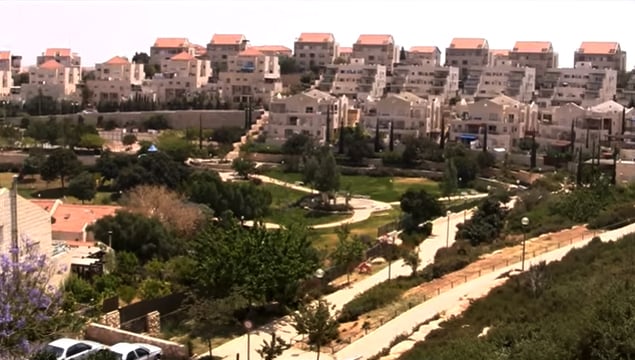The Israeli town of Ma’ale Adumim has renamed a 4,000-acre land area ‘Trump One’ as a gesture of respect toward U.S. President Donald Trump, reflecting confidence in his support for Jewish communities. However, plans to develop this land are currently met with international opposition

Israel recently took a striking step to honor former U.S. President Donald Trump by renaming a significant portion of land within the town of Ma ’ale Adumim as “Trump One” (T1). This decision is a reflection of the deep gratitude Israel holds for Trump’s unwavering support during his presidency, a time marked by several pivotal U.S. policy shifts that bolstered the bond between the two nations.
Thank you for reading this post, don't forget to subscribe!The renaming is not an isolated incident but part of a broader pattern of recognition by Israel for Trump’s policies, which continue to resonate across the region. A Symbolic Tribute in Ma’ale Adumim Ma’ale Adumim, one of Israel’s largest towns in the Judea region, made the decision to rename its key development zone as “Trump One.”
The newly named area, covering approximately 4,000 acres, was previously known as E1 or Mevaseret Adumim. According to Ma’ale Adumim’s Mayor Guy Yifrach, the decision underscores the town’s appreciation for Trump’s support of Israel’s sovereignty.
Yifrach described the land as crucial to Israel’s national and demographic goals, particularly with regard to expanding housing opportunities in the region. In discussing the significance of the renaming, Mayor Yifrach remarked,
Trump’s second term is a unique opportunity to strengthen Jewish communities, especially in Judea and Samaria. We trust Trump and believe that he will promote construction in the region in the coming months.
The development of this land has long been a strategic priority for Israel, given its proximity to Jerusalem. Building in the area would connect Ma’ale Adumim to the nation’s capital, ensuring greater territorial continuity between these critical regions. This move is seen as a way to solidify Israeli control over the Jerusalem metropolitan area, a goal that has been championed by various Israeli leaders.
“Trump Heights” to “Trump One” The decision to name “Trump One” is not without precedent. In 2019, Israel named a new settlement in the Golan Heights “Trump Heights” to commemorate Trump’s recognition of Israeli sovereignty over the contested region. This bold acknowledgment by Trump marked a significant shift in U.S. foreign policy and was celebrated as a major victory for Israel. “Trump Heights” has since evolved into a thriving community and a symbolic reminder of Trump’s contributions to Israel.
The settlement, located in the northern part of the country, has also become a popular tourist destination, further cementing its place in Israel’s national consciousness. Visitors to “Trump Heights” often view it as a symbol of the strong partnership between Israel and the United States and as recognition of Trump’s unprecedented support for Israel during his presidency.
Trump’s Impact on U.S.-Israel Relations Trump’s policies during his presidency redefined the U.S.-Israel relationship in several transformative ways. Most notably, in 2017, he recognized Jerusalem as the capital of Israel, breaking with decades of U.S. foreign policy.
This announcement was followed by the historic relocation of the U.S. Embassy from Tel Aviv to Jerusalem in 2018, a move that was met with widespread celebration in Israel. Additionally, Trump’s decision to recognize Israeli sovereignty over the Golan Heights further solidified his legacy in the region. The Golan Heights, a strategically significant area, has long been a point of contention between Israel and Syria. Trump’s recognition of Israel’s claim to the territory was seen as a major step toward ensuring the nation’s security and territorial integrity.
These actions not only bolstered Trump’s reputation as a staunch ally of Israel but also endeared him to many Israelis who saw his presidency as a turning point in the U.S.-Israel alliance. Challenges and Criticism Despite the celebrations surrounding “Trump One” and “Trump Heights,” these moves have not been without controversy. The E1 area, where “Trump One” is located, has been a focal point of international debate for years. Israel’s plans to build over 3,000 homes in the area have faced significant pushback from the international community, including the United States under the Biden administration.
Critics argue that development in E1 could undermine the possibility of a two-state solution by further fragmenting Palestinian territories and cutting off access between parts of the West Bank. Human rights organizations, along with international entities like the United Nations and the European Union, have consistently expressed concern over Israel’s settlement expansion policies, viewing them as obstacles to achieving peace in the region. Israeli officials, however, maintain that the development of E1 is both a national necessity and a matter of sovereignty. They argue that the area lies within Israel’s municipal boundaries and that expanding housing there is essential to addressing the country’s growing population needs. Moreover, they contend that construction in the region will strengthen Israel’s territorial claims and provide greater security.
The Broader Implications of “Trump One” The renaming of E1 to “Trump One” is emblematic of the lasting impact Trump’s presidency has had on Israel. It reflects not only a gesture of appreciation but also the enduring influence of his policies on the region’s geopolitical landscape. The symbolism of “Trump One” extends beyond its local significance, serving as a reminder of the strong partnership between the United States and Israel during Trump’s tenure. At the same time, the renaming highlights the complexities of the Israeli-Palestinian conflict. Settlement expansion in contested areas remains a deeply polarizing issue, with strong opinions on both sides. While Israel views such developments as crucial to its national security and housing needs, the international community often perceives them as impediments to peace.
Looking Ahead:- The Future of “Trump One” The future of “Trump One” will likely hinge on a combination of domestic and international factors. Domestically, Israeli leaders are eager to proceed with construction projects in the area to address pressing housing demands and to reinforce their strategic goals. However, international resistance, particularly from the Biden administration, could slow the pace of development. The Biden administration has signaled its intention to return to a more traditional approach to Middle East policy, which may include renewed pressure on Israel to halt settlement expansion. As a result, Israel may need to navigate a delicate balance between pursuing its national priorities and addressing international concerns.
Conclusion The renaming of the E1 area to “Trump One” stands as a powerful testament to the legacy of Donald Trump’s presidency and its profound impact on Israel. It symbolizes the gratitude Israel holds for his policies and the enduring partnership between the two nations. At the same time, it serves as a focal point for broader discussions about the Israeli-Palestinian conflict and the challenges of achieving peace in the region. While the future of “Trump One” remains uncertain, its significance is undeniable. Whether it becomes a thriving community or remains a source of contention, “Trump One” will continue to represent the indelible mark Trump left on the U.S.-Israel relationship and the complexities of Middle Eastern politics.















